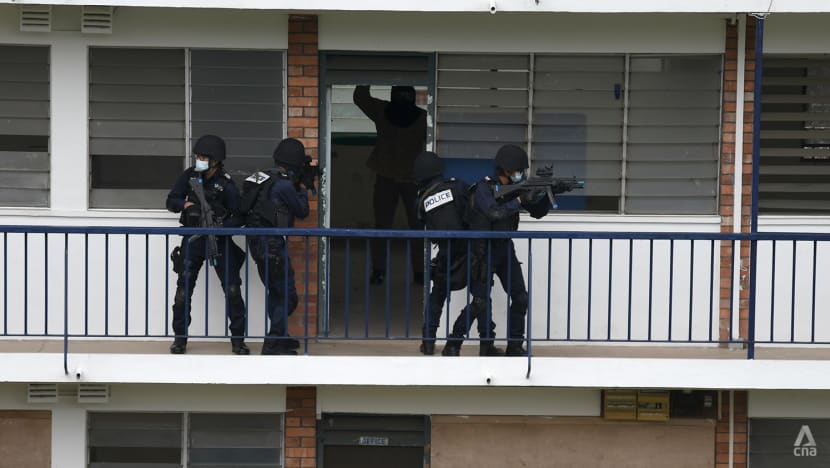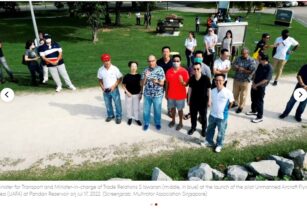Terrorist activity could rise as COVID-19 travel restrictions ease; threat to Singapore still high: ISD
 July 13, 2022
July 13, 2022
 Police officers close in on a “terrorist” during a counterterrorism demonstration on Dec 16, 2021. (Photo: CNA/Calvin Oh)
Police officers close in on a “terrorist” during a counterterrorism demonstration on Dec 16, 2021. (Photo: CNA/Calvin Oh)
SINGAPORE: The easing of COVID-19 travel restrictions globally could lead to an increase in terrorist movement and activities, the Internal Security Department (ISD) said on Wednesday (Jul 13), adding that the terrorist threat to Singapore remains high.
“Foreign terrorist fighters may make their way to new conflict zones and hotspots, while radicalised individuals may put into action their attack plans conceived during the pandemic,” the department said in its annual terrorism threat assessment report.
“Singapore continues to be featured on terrorist propaganda and is viewed as an attractive target for attack by both foreign terrorist groups and self-radicalised lone actors alike.”
Despite that, ISD said there is currently no specific intelligence of an imminent terrorist attack on Singapore, although it urged people to stay alert to “threats on the horizon”.
“The transnational nature of terrorism means that developments further afield, such as those in the Middle East and Afghanistan, can reverberate much closer to home,” it said.
“Extremists are adept at opportunistically exploiting such overseas conflicts to promote their radical narratives and recruit supporters by tapping on a diverse range of grievances.”
The “high” terrorist threat remains unchanged from last year’s ISD report, which highlighted self-radicalised actors influenced by extremist materials as the main domestic terrorism threat to Singapore.
ISIS CONTINUES TO POSE “SIGNIFICANT” THREAT
Externally, ISD said terrorist groups such as the Islamic State in Iraq and Syria (ISIS) pose a persistent threat with their ability to radicalise and inspire attacks among their followers.
“ISIS continues to pose a significant security threat globally despite its leadership and territorial losses in the core conflict zone,” ISD said, pointing to how it appointed a new leader about a month after its former figurehead died during a US raid in February.
Within Southeast Asia, ISIS affiliates are the primary driver of terrorism and pose the most immediate threat through their ability to mount ISIS-inspired attacks, ISD said.
Pro-ISIS militant factions in southern Philippines persistently engage security forces in insurgent-style armed clashes, while ISIS-aligned Jemaah Ansharut Daulah elements in Indonesia have remained active in plotting attacks, the department said.
“In the past year, the number and scale of ISIS-linked or inspired terror attacks and plots in Southeast Asia have declined, largely due to strong counter-terrorism measures and COVID-19 travel restrictions,” ISD said.
“Given that travel restrictions around the world are being lifted, this lull is likely to be temporary.”
Terrorist elements may become “more active and revisit plots that had been put on hold” as restrictions are relaxed and cross-border travel resumes.
In the region, ISIS’s violent ideology continues to resonate with radical Islamists, fuelled by a thriving pro-ISIS ecosystem on social media, ISD said.
The department explained that these online networks allow like-minded individuals in the region to coordinate terror activities across physical borders and exchange operational expertise, such as in weapons-making.
“As travel restrictions ease, online collaboration between extremists could manifest as real-world attacks,” it said.
“Consequently, the region faces a heightened risk of ISIS-inspired attacks conducted by home-grown extremists, acting alone or in small groups.”
In the West, however, ISD believes that the threat from far-right extremism has “overshadowed that of Islamist terrorism”.
ISD pointed to recent mass shootings in the US where two gunmen killed 33 people in supermarkets, highlighting that they were apparently inspired by Brenton Tarrant, the white supremacist who killed 51 worshippers in two mosques in Christchurch, New Zealand in 2019.
“Globally, the Russian-Ukraine conflict may serve as a rallying point for far-right extremism elements, who have shown an interest in the Russia-Ukraine conflict since Russia’s annexation of Crimea in 2014,” ISD said.
ISD noted reports that about 20,000 volunteers – likely including far-right extremism elements – have responded to Ukraine’s invitation to join its international legion, and that several western countries have contributed “significant caches” of weapons to Ukraine’s defence.
“Far-right extremism-aligned foreign fighters and the proliferation of surplus weapons would be likely by-products of a prolonged conflict in Ukraine,” ISD added.
SELF-RADICALISATION THREAT IN SINGAPORE
In Singapore, ISD said the threat of self-radicalisation continues to be the “primary driver” of the domestic terrorism threat.
Since 2015, 45 self-radicalised people, comprising 33 Singaporeans and 12 foreigners, have been issued with orders under the Internal Security Act (ISA).
ISD cited the latest case of 29-year-old Singaporean Radjev Lal Madan Lal, who was detained under the ISA in April.
Radjev was introduced in 2013 to the online sermons of a radical preacher from Trinidad and Tobago, and over time became “deeply radicalised” by his teachings and those of other foreign radical preachers.
Radjev believed he needed to conduct armed violence against “enemies of Islam”, and considered travelling to Afghanistan to join Taliban militants. He also tried to recruit his family and friends, and created a social media group to propagate his ideologies, ISD said.
While he did not have specific attack plans, Radjev admitted that he was willing to conduct an attack in Singapore or against Singapore’s interests overseas, the department said.
“The case of Radjev underscores the pervasiveness of terrorist and extremist ideologies online, including those propagated by foreign preachers and ideologues,” it added.
“It is thus important to maintain Singapore’s zero-tolerance approach towards extremist rhetoric and hate speech, and to inoculate the wider community against radical ideologies.”
Some Singaporeans have also participated in terrorism financing activities, and ISD said Singapore takes a firm stance against this.
Thirteen people, comprising three Singaporeans and 10 foreigners, have been convicted under the Terrorism (Suppression of Financing) Act, which was introduced in 2002.
In the past 12 months, a Singaporean and a Bangladeshi were convicted under Act. Singaporean Mohamed Kazali Salleh gave a Malaysian man more than S$1,000 in 2013 and 2014 to facilitate the latter’s journey to Syria to become an ISIS fighter.
Bangladeshi Ahmed Faysal transferred a total of about S$900 via online platforms between February and October 2020. He knew the money would benefit the terrorist group Hayat Tahrir Al-Sham in Syria, said ISD in its report.
“ISD and Home Team agencies will continue to work together with other government agencies and the community to keep Singapore safe and secure,” ISD said.
“Members of the public also play a critical role in countering terrorism through their preparedness and vigilance.”
ISD stressed that “time is of the essence” when someone displays signs of radicalisation, citing how fewer than half of the respondents in a 2021 government survey indicated they would contact the authorities if they believed that one of their loved ones showed such signs.
A representative sample of 2,012 Singaporeans and permanent residents were involved in the survey.
“By alerting the authorities early, we can help the individual to receive timely help, guidance, and counselling,” ISD said.
“The identity of the informer will be protected. When a report is made, authorities will carry out checks to ascertain the veracity of the report,” it added.
“In situations where there are no indications of radicalisation, no further action will be taken against the individual(s).”
















































